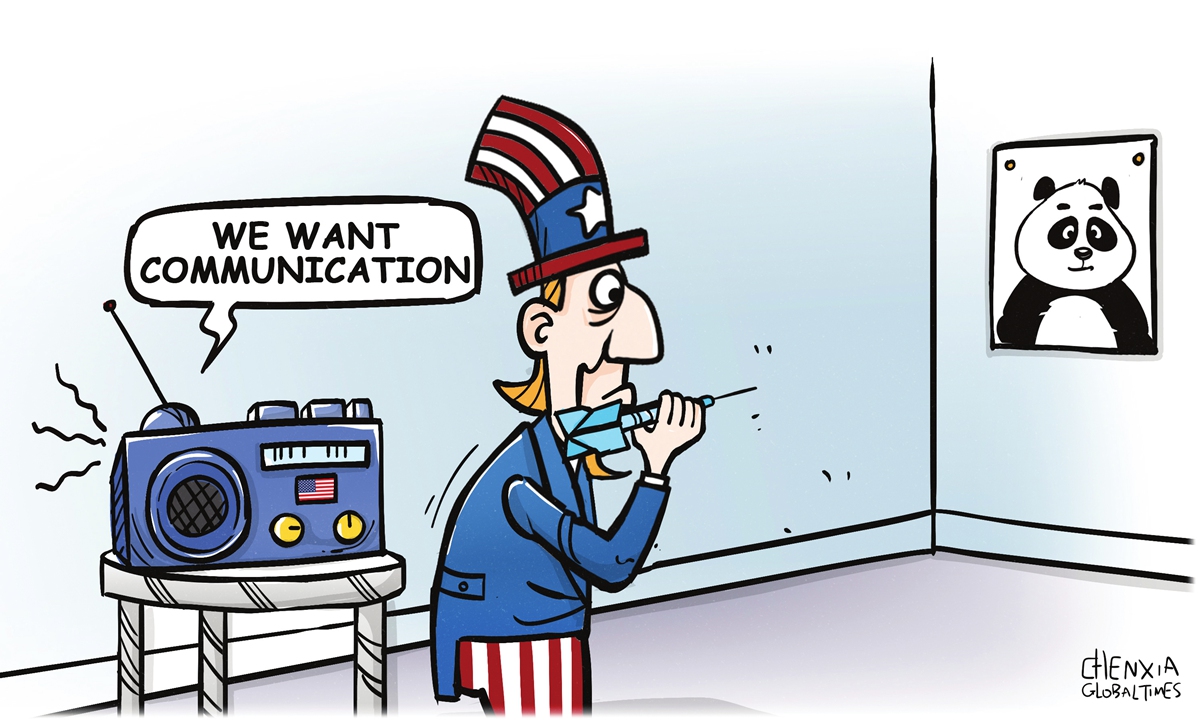
Illustration: Chen Xia/GT
The US blamed China for the failure to convene a meeting between the defense chiefs of both countries during the Shangri-La Dialogue in Singapore. According to the US, it had requested a meeting a month ago, but China refused.
Later, it released a video of what the Pentagon called an "unprofessional intercept" by a Chinese fighter jet of a US reconnaissance aircraft, creating a tense atmosphere, while the US Defense Secretary Lloyd Austin called at the Shangri-La Dialogue for more talk to avoid misunderstandings and miscalculations that could lead to crisis.
However, with just a little analysis of the various behaviors and logic displayed by the US, anyone would doubt whether the US genuinely wants to promote high-level communication between the two militaries.
First, communication requires sincerity and the creation of actual conditions for resolving practical issues. While the US talks about seeking to communicate, its actions in practice actually harm Chinese interests. Under such circumstances, with the US intruding into China's territorial waters under the banner of "freedom of navigation," continuously conducting training activities in the vicinity of China, and forming small circles to smear the Chinese military, which country would be willing to communicate with the US?
Washington has shown no sincerity for communication; what it has presented is merely a posture of seeking communication. Communication is a means to negotiate and solve problems, but for the US that is not the end goal. The US claims that communication is for risk and crisis management, but these risks are all manufactured and deliberately created by the US itself. How can the US expect China to manage the crises that it is orchestrating?
Moreover, communication requires respect and the creation of an atmosphere for fostering exchanges. The key to relations between nations is to respect each other's core interests and major concerns. But regrettably, the US has failed to show respect for China, especially regarding the Taiwan question.
Over a period of time, some US politicians have provocatively visited Taiwan or met with Taiwan authorities' officials in order to gain domestic political capital. The US has also frequently dispatched warships through the Taiwan Straits, undermining peace and stability and sending a seriously wrong signal to the "Taiwan independence" secessionist forces.
The Chinese people across the Taiwan Straits do not want a war. Neighboring countries do not want a war. How about those US politicians who claim to win over China? At least from their behavior of promoting arms sales to Taiwan and discussion about destroying TSMC, they very much want a war. Against such a backdrop, how could the defense chiefs of China and the US meet?
Furthermore, communication requires action and removing barriers. In 2018, the US imposed unreasonable unilateral sanctions on the Chinese military on the grounds of China-Russia military cooperation. Over five years have passed, and the so-called sanctions have not been lifted. The US side even claimed that the sanctions do not affect the normal communication between the defense chiefs of the two countries.
The US is well aware of China's firm stance against unreasonable sanctions but has tried to avoid discussing it. What we have seen is a fragmentation of American domestic politics. The Biden administration and the US military did not have the courage to rule out domestic political interference, remove manufactured communication barriers, and facilitate a formal meeting between the two defense chiefs.
Not only is the US unwilling to admit its own internal political constraints, but it also shifts responsibility to China. How can communication be achieved when actions are slow, and obstacles are not eliminated? Even Austin himself said that "A cordial handshake over dinner is no substitute for a substantive engagement." If the US really wants to have a meaningful dialogue, it is time to take practical measures.
Under the background of the US' containment on China and close-in reconnaissance, in the context of the US providing weapons and ammunition to the "Taiwan independence" forces, the US wants to discuss with China the issue of installing "guardrails" and the rules governing the conduct of the two militaries at China's doorstep. This is ostensibly aimed at maintaining its so-called leadership image that pursues a "stable, free and open Indo-Pacific," but in fact is a veiled attempt to provoke confrontation. How can China respond to such proposal?
The author is the director of the National Security College at the People's Liberation Army National Defence University. opinion@globaltimes.com.cn




